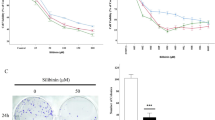Abstract
Purpose
Colorectal cancer (CRC) is one of the most lethal and prevalent cancers throughout the world. Despite the remarkable advance in the field, drug resistance still remains as an unresolved problem in cancer. Hence, finding effective compounds with minimal side effects to fight cancer is of central priority. Herbal products have been traditionally used to prevent and treat a variety of diseases.
Methods
In the present study, the antitumor effect of Terminalia catappa plant ethanolic extract (TCE) was assessed on SW480 CRC model cell line. In this regard, effects of TCE were evaluated on the proliferation, apoptosis, and migration of SW480 cells by 3-(4,5-dimethylthiazol-2-yl)-2,5-diphenyltetrazolium bromide (MTT) assay, Annexin V/PI flow cytometry, and scratch tests, respectively. Furthermore, changes in the expression of genes involved in these events including Bax, Bcl-2, Caspase 3, Caspase 8, Caspase 9, MMP-13, miR-21, and miR-34a were measured by quantitative real-time PCR (qRT-PCR).
Results
According to the MTT results, TCE reduced the proliferation of SW480 cells significantly. The flow cytometry test also revealed a notable rate of apoptosis induction after TCE treatment. An inhibitory effect on cell migration was also evident in scratch test. Expression patterns of the assessed genes also changed subsequent to TCE treatment.
Conclusion
The results of this study indicated that T. catappa could be considered as a potential source of anticancer compounds and a candidate for further investigations.





Similar content being viewed by others
References
Asadi M, et al. Expression level of caspase genes in colorectal cancer. Asian Pac J Cancer Prev. 19(5):1277–80.
Venus Z, et al. mRNA expression of nuclear factor of activated T-cells, cytoplasmic 2 (NFATc2) and peroxisome proliferator-activated receptor gamma (PPARG) transcription factors in colorectal carcinoma. Bosnian J Basic Med Sci. 2017;17(3).
Shekari N, Asghari F, Haghnavaz N, Shanehbandi D, Khaze V, Baradaran B, et al. Let-7a could serve as a biomarker for chemo-responsiveness to docetaxel in gastric cancer. Anti Cancer Agents Med Chem. 2019;19(3):304–9.
Ezeokonkwo CA, Dodson WL. The potential of Terminalia catappa (tropical almond) seed as a source of dietary protein. J Food Qual. 2004;27(3):207–19.
Kinoshita S, Inoue Y, Nakama S, Ichiba T, Aniya Y. Antioxidant and hepatoprotective actions of medicinal herb, Terminalia catappa L. from Okinawa Island and its tannin corilagin. Phytomedicine. 2007;14(11):755–62.
Fan YM, Xu LZ, Gao J, Wang Y, Tang XH, Zhao XN, et al. Phytochemical and antiinflammatory studies on Terminalia catappa. Fitoterapia. 2004;75(3–4):253–60.
Chu SC, Yang SF, Liu SJ, Kuo WH, Chang YZ, Hsieh YS. In vitro and in vivo antimetastatic effects of Terminalia catappa L. leaves on lung cancer cells. Food Chem Toxicol. 2007;45(7):1194–201.
Yeh CB, et al. Terminalia catappa exerts Antimetastatic effects on hepatocellular carcinoma through transcriptional inhibition of matrix Metalloproteinase-9 by modulating NF-kappaB and AP-1 activity. Evid Based Complement Alternat Med. 2012;2012:595292.
Yang SF, Chen MK, Hsieh YS, Yang JS, Zavras AI, Hsieh YH, et al. Antimetastatic effects of Terminalia catappa L. on oral cancer via a down-regulation of metastasis-associated proteases. Food Chem Toxicol. 2010;48(4):1052–8.
Silva AMR, et al. Comparison of ultrasound-assisted extraction and dynamic maceration over content of tagitinin C obtained from Tithonia diversifolia (Hemsl.) a. gray leaves using factorial design. Pharmacogn Mag. 2017;13(50):270–4.
Zarredar H, et al. Targeting the KRAS, p38alpha, and NF-kappaB in lung adenocarcinoma cancer cells: the effect of combining RNA interferences with a chemical inhibitor. J Cell Biochem. 2019.
Zarredar H, et al. Synergistic effect of novel EGFR inhibitor AZD8931 and p38alpha siRNA in lung adenocarcinoma cancer cells. Anti Cancer Agents Med Chem. 2019.
Zarredar H, Ansarin K, Baradaran B, Shekari N, Eyvazi S, Safari F, et al. Critical microRNAs in lung cancer: recent advances and potential applications. Anti Cancer Agents Med Chem. 2018;18(14):1991–2005.
Safari F, et al. CRISPR and personalized Treg therapy: new insights into the treatment of rheumatoid arthritis. Immunopharmacol Immunotoxicol. 2018;40(3):201–11.
Hosseini B-A, et al. Dichloromethane fractions of Scrophularia oxysepala extract induce apoptosis in MCF-7 human breast cancer cells. Bosnian J Basic Med Sci. 2015;15(1):26.
Ko TF, et al. Antimutagenicity of supercritical CO2 extracts of Terminalia catappa leaves and cytotoxicity of the extracts to human hepatoma cells. J Agric Food Chem. 2003;51(12):3564–7.
Lee CY, Yang SF, Wang PH, Su CW, Hsu HF, Tsai HT, et al. Antimetastatic effects of Terminalia catappa leaf extracts on cervical cancer through the inhibition of matrix metalloprotein-9 and MAPK pathway. Environ Toxicol. 2019;34(1):60–6.
Zarredar H, Ansarin K, Baradaran B, Ahdi Khosroshahi S, Farajnia S. Potential molecular targets in the treatment of lung cancer using siRNA technology. Cancer Investig. 2018;36(1):37–58.
Bakhshaiesh TO, Armat M, Shanehbandi D, Sharifi S, Baradaran B, Hejazi MS, et al. Arsenic trioxide promotes paclitaxel cytotoxicity in resistant breast cancer cells. Asian Pac J Cancer Prev. 2015;16(13):5191–7.
Okada N, Lin CP, Ribeiro MC, Biton A, Lai G, He X, et al. A positive feedback between p53 and miR-34 miRNAs mediates tumor suppression. Genes Dev. 2014;28(5):438–50.
Funding
This study was funded by the Tuberculosis and Lung Disease Research Center, Tabriz University of Medical Science, Tabriz, Iran.
Author information
Authors and Affiliations
Corresponding author
Ethics declarations
Conflict of Interest
The authors declare that they have no conflict of interests.
Ethical Approval
This article does not contain any studies with human participants or animals performed by any of the authors.
Additional information
Publisher’s Note
Springer Nature remains neutral with regard to jurisdictional claims in published maps and institutional affiliations.
Rights and permissions
About this article
Cite this article
Shanehbandi, D., Zarredar, H., Asadi, M. et al. Anticancer Impacts of Terminalia catappa Extract on SW480 Colorectal Neoplasm Cell Line. J Gastrointest Canc 52, 99–105 (2021). https://doi.org/10.1007/s12029-019-00349-z
Published:
Issue Date:
DOI: https://doi.org/10.1007/s12029-019-00349-z




